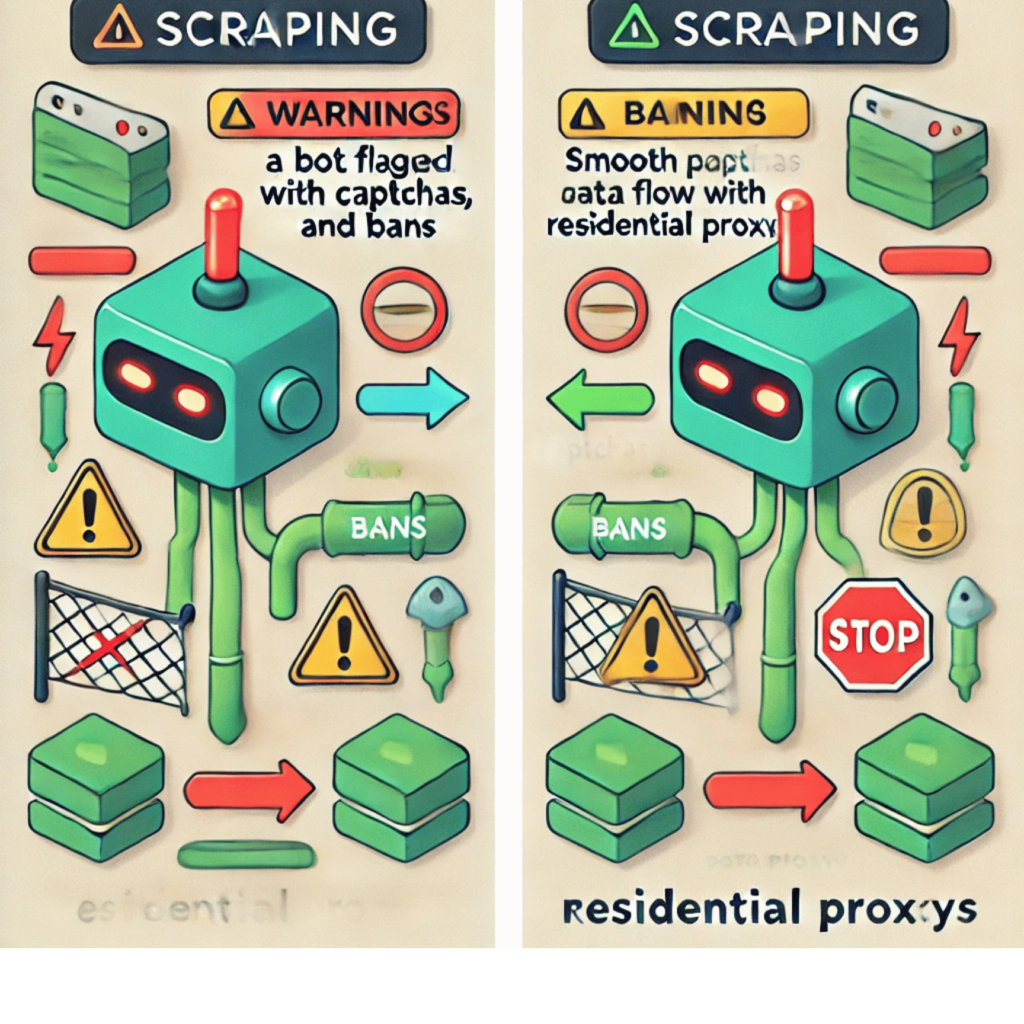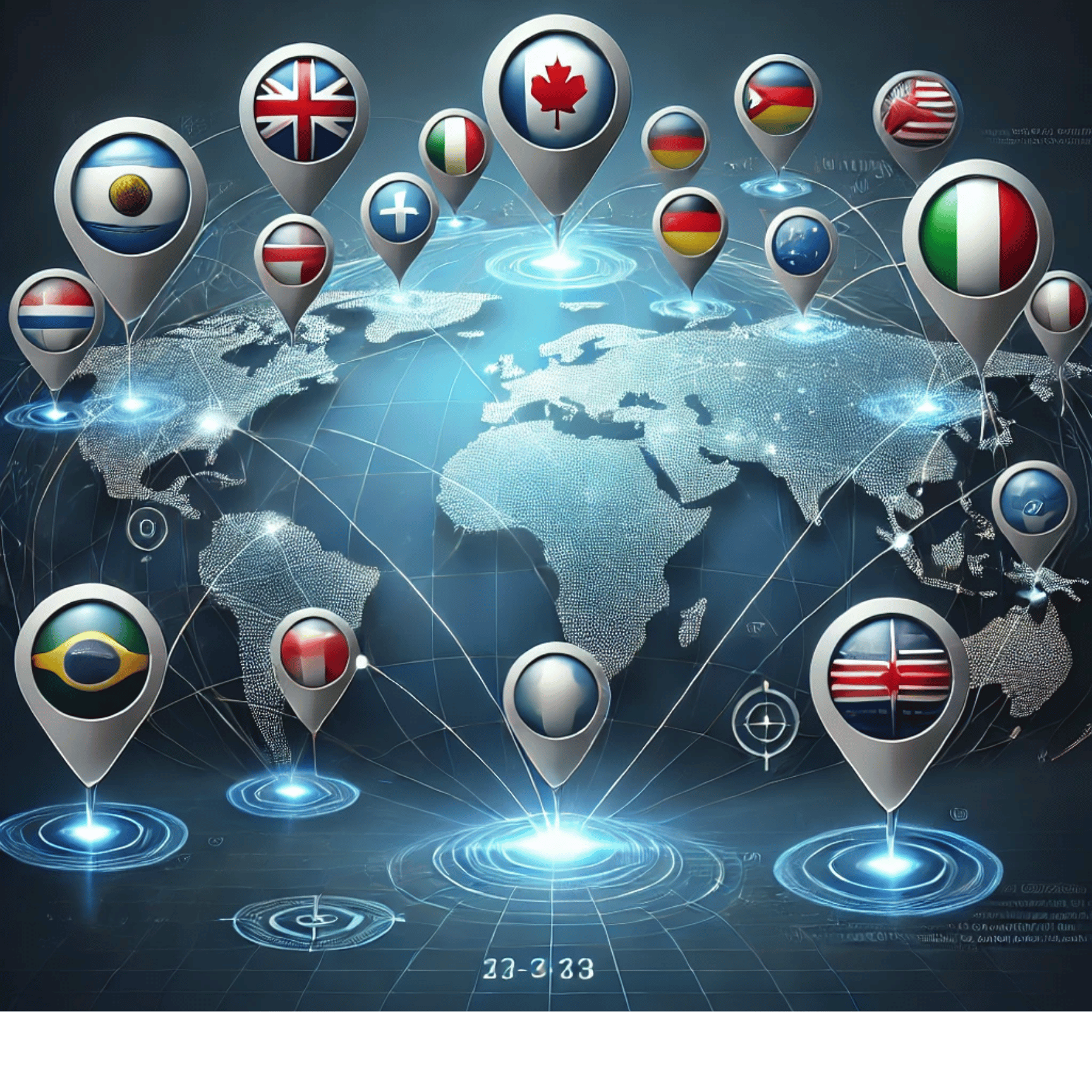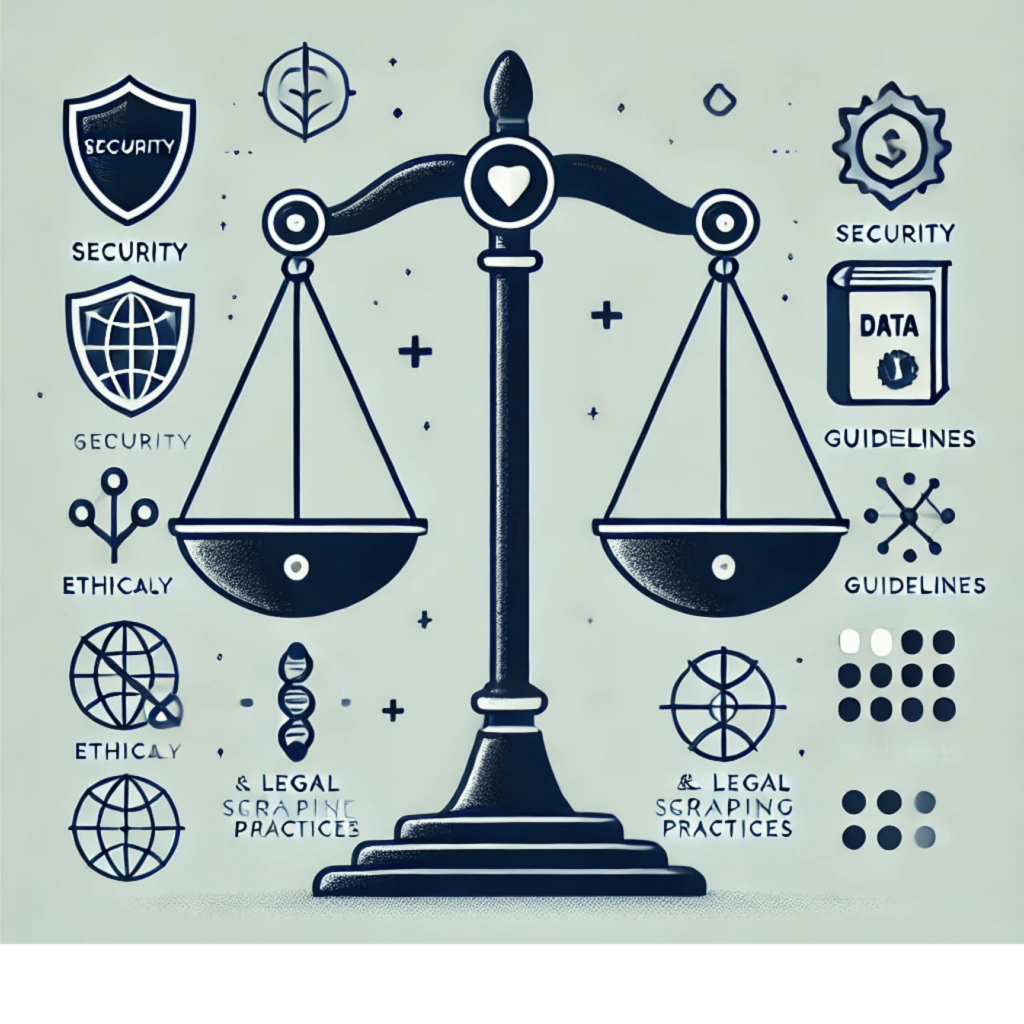Social media is the modern-day pulse of the world. It’s where conversations spark, trends explode, and behaviors shift at breakneck. For researchers and data scientists, it’s a treasure trove of insights—a swirling vortex of data just waiting to be captured, analyzed, and turned into insight.
But here’s the challenge: scraping social media data isn’t a free pass.
It’s a high-stakes balancing act. Push too hard—send too many requests, skip over ethical guidelines—and you’re not just risking bans. You’re risking everything: wasted resources, locked accounts, and, in some cases, legal consequences.
That’s where residential proxies step in.
These aren’t your everyday proxies. They’re the key to blending in—real IPs from real devices that let you gather the data you need without raising alarms. Residential proxies help you navigate platform restrictions, avoid detection, and stay on the right side of compliance.
And no one does this better than IPBurger.
With over 100 million ethically sourced proxies, precise location targeting in 195+ countries, and the choice between rotating or sticky sessions, IPBurger gives you the control and reliability you need to scrape social media data the smart way.
Sound impossible? It’s not.
Sound necessary? It absolutely is.
Ready to scrape safely, legally, and efficiently?
This guide will show you how.
What Is Social Media Data Scraping?
Let’s start with the basics.
Social media scraping is the process of extracting data from platforms like Instagram, Twitter, LinkedIn, and others. This data can include anything from hashtags and posts to user interactions, sentiment analysis, and trending topics. Done right, it fuels everything from academic research to competitive intelligence.
But let’s be clear about something: scraping isn’t a free-for-all.
While the internet might feel like the Wild West sometimes, social media platforms have rules. And breaking those rules? Not a good idea. Violations can result in account bans, legal headaches, and a reputation hit you don’t want.
Here’s where the ethical line is drawn:
- What’s okay: Gathering publicly available data (think tweets, hashtags, or open profiles).
- What’s not okay: Harvesting personal user information or bypassing privacy settings.
Even when you’re in the clear ethically, technical barriers—like CAPTCHAs, IP blocks, and rate limits—can stop you dead in your tracks.
And guess what? Platforms are getting better at catching scrapers. According to a report by Akamai, 42% of all internet traffic is made up of bots, with scraping bots accounting for a significant portion. Websites, especially social media platforms, have become adept at detecting and blocking this kind of activity.
So how do you scrape data without triggering alarms?
That’s where residential proxies come in. But we’ll get to that. For now, let’s focus on why social media scraping is so valuable.
Why Is Social Media Scraping So Valuable?
Because data is everything.
Whether you’re conducting academic research, analyzing audience trends, or planning a business strategy, social media platforms are an endless well of actionable insights. Let’s break it down.
1. Understanding Audiences
Social media is the closest thing we have to a public diary. People share their interests, frustrations, and aspirations—all in real time. By scraping this data, you can pinpoint what your target audience cares about right now.
For researchers, it’s a way to track societal trends. For businesses, it’s a shortcut to knowing your customers better than your competitors.
2. Competitive Intelligence
Your competitors are out there, making moves. Social media scraping lets you keep tabs on their campaigns, products, and audience engagement. It’s like having a window into their strategy—without stepping over any ethical lines.
3. Real-Time Insights
In the fast-paced world of social media, timing is everything. Scraping allows you to capture data as it happens. Need to track how a hashtag is performing? Want to measure the spread of a trending topic? Real-time data is how you do it.
4. Customized Solutions
With the right tools, scraped data can feed into AI models, sentiment analysis tools, and customer relationship management systems to build highly tailored solutions. Think chatbots that speak your audience’s language or ad campaigns that hit the right emotional note.
But Why Scrape When APIs Exist?
Good question. Here’s the reality: APIs are limited. They often cap how much data you can access and may charge hefty fees. Plus, APIs don’t always provide the granularity you need. Social media scraping, powered by residential proxies, lets you work around these restrictions without violating terms of service.

Challenges in Social Media Scraping
Scraping social media? It’s like trying to navigate a high-security vault with nothing but a paperclip. Platforms are designed to detect, disrupt, and deny access to anyone or anything that doesn’t play by their rules.
Here’s the reality:
1. IP Bans: The Silent Assassin
It starts subtly. You’re pulling data, your tool’s running fine, and suddenly—nothing. No access. No warning.
Why? Social media platforms monitor for patterns. Too many requests from the same IP? Flagged. Repeated logins across accounts? Flagged. Once your IP is on their radar, you’re locked out faster than you can refresh the page.
2. CAPTCHA Challenges: A Bot’s Worst Nightmare
There’s nothing more frustrating than a CAPTCHA. Especially when it pops up right in the middle of your process.
These challenges are everywhere. In fact, over 13 million websites use CAPTCHA technology to block automation tools. And on social media platforms, CAPTCHAs aren’t occasional—they’re constant.
For scrapers, this is the equivalent of hitting a brick wall. Unless you’re equipped with the right tools—like residential proxies that mimic human activity—your work stops here.
3. Geo-Restricted Content: Locked Doors Everywhere
Imagine needing data from a specific region—only to find out it’s locked behind a geo-block. No access unless you’re physically located in that country.
Why does this happen? Platforms enforce geo-restrictions to comply with regional laws or licensing agreements. According to ExpressVPN, many services limit content based on location, making this a widespread challenge.
Without a way to mask your location or switch IPs, your dataset will be incomplete.
And the Impact?
Blocked IPs. Failed scrapes. Stalled projects.
It’s a frustrating spiral of inefficiency—one that costs time, money, and momentum. But with IPBurger’s Residential Proxies, you can sidestep these challenges entirely. Real user IPs. Seamless access. And most importantly? Results.

The Role of Residential Proxies in Overcoming Scraping Challenges
Residential proxies aren’t just another tool in your arsenal—they’re the backbone of scraping done right. These proxies use real IP addresses assigned by ISPs to real devices, meaning your requests look like they’re coming from actual users. Platforms can’t tell the difference, and that’s the secret to bypassing their defenses.
Let’s break down how residential proxies tackle the three biggest scraping obstacles:
1. Avoiding IP Bans
Scraping too many requests from the same IP is like yelling in a library—you’re going to get noticed. Platforms watch for patterns like this and will block your IP faster than you can say “data unavailable.”
Here’s how residential proxies help:
- They rotate your IP address with every request (or as often as you need), making it look like your traffic is coming from multiple users instead of a single source.
- With IPBurger’s 100 million+ residential IPs, you’re pulling from a massive pool of addresses that ensure high anonymity and reduce the risk of bans.
Plus, sticky proxies allow you to keep the same IP for up to 30 minutes when consistency matters—like for logging into accounts or maintaining sessions.
2. Dealing with CAPTCHAs
Nothing kills your workflow like a CAPTCHA challenge. These are designed to trip up bots, but residential proxies help you avoid them altogether.
Here’s why:
- Traffic from residential proxies looks like it’s coming from real users with high trust scores.
- IPBurger’s ethically sourced proxies reduce the chances of triggering CAPTCHA prompts by mimicking natural user behavior.
Result? Fewer interruptions, smoother operations.
3. Accessing Geo-Restricted Content
Ever tried to access content only to see, “This isn’t available in your region”? That’s geo-blocking, and it’s a major roadblock for scraping global data.
Here’s the fix:
- Residential proxies let you choose IPs from specific countries, states, or even cities.
- IPBurger gives you location targeting in 195+ countries, so you can collect data from anywhere without leaving your desk.
Why IPBurger Stands Out
Not all proxies are created equal. With IPBurger, you’re getting:

- Unlimited concurrent sessions for high-volume scraping.
- Reliable uptime (99.95% success rate) to keep your projects moving.
- Advanced session controls, so you can scrape at your own pace without triggering platform defenses.
The bottom line? Residential proxies are the difference between scraping chaos and scraping success. And with IPBurger, you’re equipped to handle the toughest challenges with ease.
Best Practices for Ethical and Legal Scraping

Scraping isn’t about cutting corners.
It’s about working smarter—and staying compliant.
By following best practices, you can avoid the pitfalls that plague so many scraping efforts. Bans. CAPTCHAs. Legal headaches. All of it.
Here’s how.
First, respect platform guidelines. Social media platforms set clear boundaries on what’s fair game. Public data, like hashtags, likes, or posts? That’s fine. Private information or anything protected by user privacy settings? Off-limits. Break these rules, and you risk account bans—or worse. Take the time to understand the terms of service for each platform you target.
Second, think about your request rates. Rapid-fire scraping is the equivalent of shouting in a library: you’ll get noticed. Platforms track how frequently requests are made from a single IP, and if your activity looks unnatural, you’ll trigger defenses. Mimic human behavior. Slow things down. Use tools like rate limiters to avoid raising red flags.
Then there’s privacy. This isn’t optional. Collecting sensitive or private data—intentionally or not—can land you in hot water under laws like GDPR or CCPA. Keep it clean. Audit your datasets. Stick to public-facing data only.
But here’s the game-changer: proxies.
Residential proxies are the gold standard for scraping ethically and effectively. Unlike free or data center proxies, they use real, ISP-assigned IPs, making your traffic look completely natural. IPBurger’s Residential Proxies offer features like rotating IPs (to spread out requests) or sticky sessions (to keep the same IP for a set period). The result? Fewer blocks. Fewer CAPTCHAs. And a smoother scraping process.
Finally, stay adaptive. Platforms evolve their defenses all the time—CAPTCHAs, rate limits, geo-blocks. Your scraping strategy should evolve too. Monitor your conditions. Adjust your tools. And be ready to pivot as needed.
That’s it.
Simple? Yes.
But powerful.
Ethical scraping builds trust—in your process, your results, and your tools. With solutions like IPBurger, you’ll not only stay compliant but scrape smarter, cleaner, and faster.

Why Choose IPBurger for Social Media Scraping?
Not all proxies are created equal.
When you’re scraping social media, the right tools can mean the difference between seamless success and endless frustration. IPBurger doesn’t just give you proxies—it gives you control. Every feature is designed to help you collect data effectively, ethically, and at scale
Let’s start with the numbers. With 100 million+ residential IPs in 195+ countries, IPBurger offers one of the largest proxy pools on the market. But it’s not just the size of the network that matters. Every IP is ethically sourced, so your operations stay compliant with platform policies—no cutting corners, no risking your reputation.
Precision matters. That’s why IPBurger allows targeting not only by country, but by state, city, and even specific ISPs. Need to scrape regional data from Chicago? Or analyze trends tied to a particular mobile carrier? IPBurger makes it easy to zero in on the data you actually need.
Scalability? Covered. Whether you’re running hundreds of requests or millions, IPBurger’s infrastructure is built to handle the load. Use unlimited concurrent sessions to keep workflows fast and efficient. Rely on sticky proxies to maintain session consistency for up to 30 minutes. Or switch to rotating proxies to manage high-volume requests without detection.
And then there’s reliability. 99.95% uptime. No interruptions. No delays. Just continuous, smooth access to the data you need—when you need it.
With IPBurger, you’re not just getting proxies. You’re getting a smarter, cleaner way to scrape. And that makes all the difference.
Conclusion
Scraping social media data isn’t just about pulling information—it’s about doing it right. The right tools. The right practices. And the right mindset.
From navigating IP bans to bypassing CAPTCHAs and accessing geo-restricted content, the challenges are real. But they’re also solvable. With IPBurger’s Residential Proxies, you’re equipped to scrape smarter, faster, and more ethically.
Think about what’s at stake. Reliable data powers research, drives decisions, and gives you the edge in a competitive world. But scraping recklessly? That risks everything—your projects, your reputation, and your access.
The solution is simple: tools that are designed for success. Tools that prioritize compliance, precision, and scalability. That’s exactly what IPBurger delivers.
So, if you’re ready to take your scraping game to the next level, there’s no better time to start. Choose a partner you can trust. Choose IPBurger.
FAQs
1. Is social media scraping legal?
Social media scraping is legal if you stick to public data and follow platform terms of service. Avoid collecting private or sensitive information, as this could violate data privacy laws like GDPR or CCPA. Always review the rules for each platform before starting your scraping project to ensure compliance. Ethical scraping builds trust and reduces the risk of legal consequences.
2. Why are residential proxies better than free proxies for scraping?
Residential proxies use real IPs assigned by Internet Service Providers, making them indistinguishable from regular users. Free proxies, on the other hand, are often shared, unreliable, and more likely to trigger bans or CAPTCHAs. With residential proxies, like those from IPBurger, you gain greater anonymity, better reliability, and the ability to target specific locations for precise data collection.
3. How do IPBurger proxies help with geo-restricted content?
IPBurger’s residential proxies allow you to appear as though you’re browsing from any country, state, or city. This means you can bypass geo-restrictions and access region-specific data that would otherwise be unavailable. Whether you’re researching global trends or analyzing localized social media activity, IPBurger makes it easy to collect the data you need without limitations.



